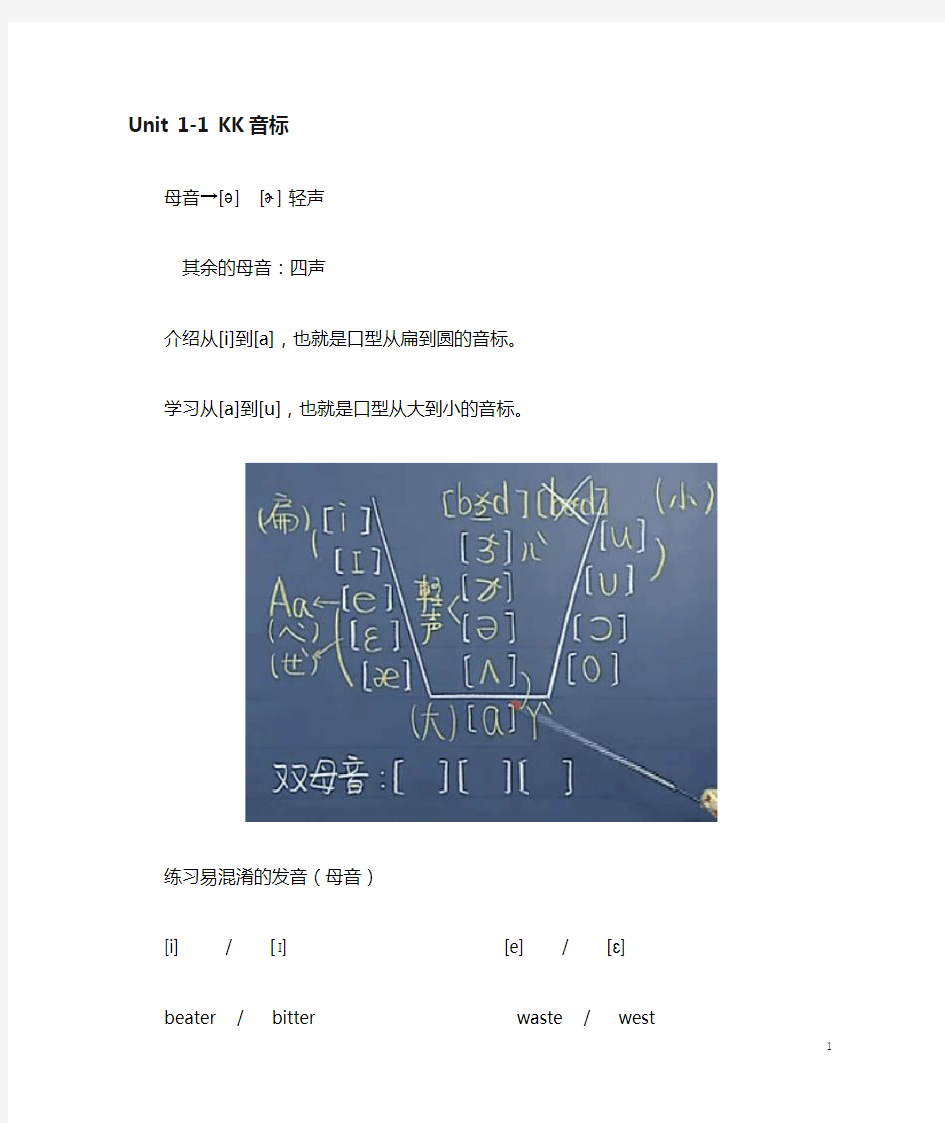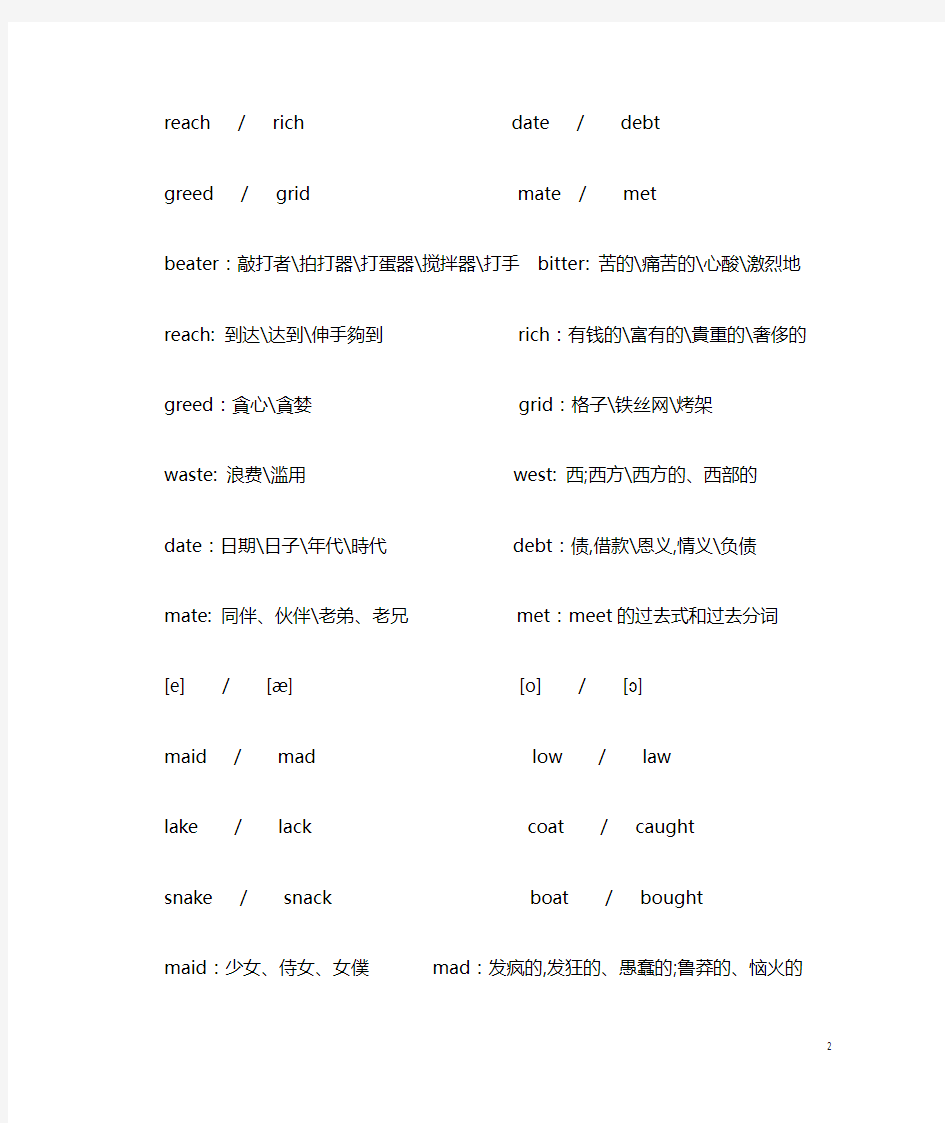谢孟媛KK音标


Unit 1-1 KK音标
母音→[?] [?] 轻声
其余的母音:四声
介绍从[i]到[a],也就是口型从扁到圆的音标。
学习从[a]到[u],也就是口型从大到小的音标。
练习易混淆的发音(母音)
[i]/[?][e]/[?]
beater/ bitterwaste/ west
reach / richdate/ debt
greed/ gridmate/ met
beater:敲打者\拍打器\打蛋器\搅拌器\打手bitter: 苦的\痛苦的\心酸\激烈地reach: 到达\达到\伸手夠到rich:有钱的\富有的\貴重的\奢侈的
greed:貪心\貪婪grid:格子\铁丝网\烤架
waste: 浪费\滥用west: 西;西方\西方的、西部的
date:日期\日子\年代\時代debt:债,借款\恩义,情义\负债
mate: 同伴、伙伴\老弟、老兄met:meet的过去式和过去分词
[e]/ [?][o]/ [?]
maid/ madlow/ law
lake/ lackcoat/ caught
snake/ snack boat/bought
maid:少女、侍女、女僕mad:发疯的,发狂的、愚蠢的;鲁莽的、恼火的lake:湖、池、深紅色lack:缺少、没有、需要
snake:蛇snack:點心、快餐、一份、部分
low:低的,矮的;浅的\没營養的\卑微地;下贱地law:法律、法規、訴訟
coat:外套、大衣、塗抹caught:catch的过去式和过去分词—抓住、趕上boat:小船、劃船、乘船bought:buy的过去式和过去分词
[?]/ [?] [a]/ [?]
Sit/ set not/ nut
tin/ten sock/ suck
listen/ lessoncollar/color
sit: 坐,坐着;就座set: 放,置;竖立;
tin:錫\ 锡制的;马口铁制的\劣等的,伪造的ten:十、十個十個的
listen:聽、听从,听信lesson:功课;课业\課程\一堂課\教训,训诫
not:不nut:堅果
sock:短袜、鞋墊、喜劇suck:吸、吸收、吸吮collar:衣服color:顏色
子音---轻声
无声子音:*p+*t+*k+*f+*s+*θ+*?][t?]
有声子音:[b][d][g][v][z][e][?][d?]
无声子音:[h]
有声子音:*m+*n+*?+*l+*r+*w+*j+
练习易混淆的发音(子音)
*s+/ *θ+ [z]/ [e]
pass/ pathsize/ scythe
sink/thinkclosed/ clothed
sum/ thumbbays/ bathe
pass:傳遞、通過path:小路、軌道
sink:下沉;(日,月)落,没think:想、思考、認為、預料
sum:总计、概況thumb:拇指、一拇指寬
size:尺寸、型號、大小scythe:长柄大镰刀
closed:關閉的、不公開的clothed:穿...衣服的、覆蓋着…的
bays:海湾bathe:把…侵入、給…洗澡
[l]/ [r] [s]/ [?]
lead / read sip/ ship
flea / free seat/ sheet
cloud / crowd see/ she
lead:領導、引路、指揮read:讀、攻讀、研究、察覺
flea:跳蚤free:自由的;不受控制的\免費的、空閑的
cloud:雲crowd:人群、大堆、許多、一幫sip:啜饮、一小口ship:船,舰
seat:座位、位置、職務sheet:床單、表格、單子
see:看、看到、目睹she:她
Unit 2拼读练习
拼读原则→子音+母音(后母接前子)
*i+→we, see, three, bunny, field
※We see three bunnies in the field.
[?+→Tim, grill, six, fish
※Tim grilled six fish.
*e+→May, bake, eight, cake
※May baked eight cakes.
[?+→Ted, help, them, sell, seven, egg
※Ted helped them sell even eggs.
[?+→that, man, cast, glance, at, cat
※That man cast a glance at that cat.
*a+→ watch, are, not, clock.
※Watches are not clocks.
A watch is not a clock.
*o+→those, owner, row, old, boat
※Those owners rowed old boats.
[?+→Paul, caught, all, ball
※Paul caught all balls.
[U+→wolf, pull, wooden, hook
※A wolf pull wooden hooks.
*u+→Sue, blew, two, blue, bollon
※Sue blew two blue bollons.
[?+→one, dump, truck, bump, bus
※One dump truck bumped one bus.
[?+→the, polite, Aamerican, awake
※The polite American awaked.
[?] [?+→thirty, person, never, learn, verb, mother
※Thirty persons never learned verb with Mother.
*ai+→Mike, ride, white, bike
※Mike rieds a white bike.
*au+→our, cow, found, house
※Our cow was found in our house.
*oi+→Joy, toy
※Joy plays toys with joy.
Unit 3自然发音
※26个字母在单词中的发音规则。我们学习自然发音,所谓自然发音就是基本无需看音标就会读单词,自然发音的第一种情况,就是一般情况下字母在单词中都是发这种音,掌握这些规则,就成功了70%。
Aa[?] bag, cat, jamBb[b] bat,bed, boy
Cc[K] can, car, coatDd[d] dog, door, duck
Ee[?] bell, desk, redFf[f] face, fan, food
Gg[g] game, girl, legHh[h] hat, hari, hope
Ii[?] bid, kiss, sixJj[d?] job, july, jump
Kk[k] key, king, kiteLl[l] lake, leaf, light
Mm[m] man, mask, meatNn[n] name, neck, night
Oo[o] cold, rose, smokePp[p] pig, pen, pork
Qq[kw] quit, queen, questionRr[r] rabbit, rain, right
Ss[s] sale, sea, busTt[t] table, time, point
Un[?] cup, luck, sunVv[v] vase, voice, glove
Ww[w] watch, web, workXx[ks] box, ax, ox
Yy[j] yellow, yes, youngZz[z] zero, zoo, size
自然发音的特殊情况,也就是同一字母的发音产生了规则外的变化。
※dog[?]god[a]
*i+→e: we
ee: feet, see
ea: heat, flea
y: lady, easy
ie: field, thief
[?+→i: dig, milk
y:gu, dirty
*e+→a..e: name, lake ai: nail, rain
ay: day, way
ea: steak, great [?+→e: bed, cell
ea: bread, head
e..e: sense, fence
*?+→a: cat, flag
*a+→o: lock, clock
a: watch, arm [?+→o(r): for, door
a(l): talk, walk
a(ll): ball, tall
ay: cause, pause
aw: saw, law
[U+→oo: book, cook
u: put, push
*u+→oo: moon, food u: ruby, July ue: blue, true ew: flew, blew
u-e: rule, flute [?+→u: Dutch, fun
o: son, come
ou: double, southern [?+→a: ago, about
e: quiet, happen i: direct, possible
o: today, second
u: circus, album [?+→er: after, sister or: tailor, actor [?+→ur: burn, fur
er: clerk, verb
ir: bird, girl
*ai+→i..e: bike, kite
y: cry, dry
i: child, kind
ie: die, pie
igh: night, right
*au+→ou: cloud, houst
ow: cow, down
[?i+→oi: coin, point
oy: boy, enjoy
子音
*k+→c: cat, cot, cut
k: key, king
ck: luck, back
lk: talk, walk
q(在u之前): queen, quit
[g]→g: 在a, o, u或者其它子音前
gate, got, green
在字尾:bag, dog
gh: ghost
*f+→f: fan, five
ff: muffin, off
ph: phone, photo
if: shelf, half
gh:(在au, ou)之后,laugh, enough
*s+→C(在i, e, y之前):circle, cent, cycle
s: sun, bus
ss: boss, kiss
[?+→sh: shark, fish
※若s和h出现在不同音节,不这么发,如:dishonor, ti: nation, station
sci: conscience
ch:(常出现在法国字演变成的英文字) chef, chalet
ssi: mission
s: sure, sugar
si: mansion
*θ+→th: thin, bath
*e+→th: that, gather
※但Thomas, thyme
[?+→si: vision, oc casion,
s: pleasure, measure
g: fouge, garage
[t?+→ch: cheese, lunch
t: nature, situation
tch: match, catch
[d?+→g(在i, e, y之前)gentle, giant
j: just, enjoy
age: bridge, judge
d: graduation, education
*h+→h: hat, ham
wh: who, whom, whose
*n+→n: can, nest
nn: runner, dinner
kn: knife, sign
*?+→n(在k之后):pink, think
ng: ring, song
※ng发[ng]的音有finger, kangaroo
*j+→y: yellow, you
i:onion
子音字母省略不发音的情况:
b→在t或m前不发音:debt, thumb
c→ck的c不发音:pick, lick
偶尔在s之后不发音:scene
g→在n之前不发音:gnash, degign
gh→在t之前不发音:bought, caught
h→在r或ki之后不发音:rhyme, khaki
→和母音同时出现在字尾:ho, hurrah
→偶尔在子音和费重音节母音之间不发音:shepherd →偶尔在字首不发音:hour, honor
→在ex之后,exhaust
k→和n同时出现在字首时不发音:know, knee
l→在alk, alm, alf中不发音:talk, calm, half
→在ould中不发音:should, could
n→和m同时出现时不发音:autumn, column
p→在n, s, t之前不发音:psychology
s→偶尔在i之后不发音:island, aisle
→在Arkansas字尾的s: Arkansas
t→sten及-stle中的t不发音:fasten, castle
→源自法国字的t不发音:depot, ballet
u→偶尔在g和q之后不发音:guard
w→和r同时出现在字首时不发音:write, wrong
→在某些单字中不发音:two, answer, sword
Unit 4 Part 1 重音练习
本集课当中,我们会学习1)单音节子音(轻声)+母音(四声)→四声;2)二音节。3)三音节。4)四音节。避免查完字典却由于不懂重音的发音规则,而不会念的情况。单词的重音和在句子中每个单词的重音非重音情况,同一句话,因为重音的位置不同,会有不同的意思,这篇发音教程同样分解了听力中的一些技巧。比如可以通过重音的落脚点,判断出A\B\C\D哪个答案是对的。(当然这是投机取巧,还是把发音学到位吧)
A. 单音节子音(轻声)+母音(四声)→四声
例:go, cat, beat, stop
B.二音节
例:pretend, tonight, a dog, Who knows?
例:sunset, modern, notebook, phone book
C. 三音节
例:calendar, article, digital, show me one
例:tomorrow,potato, a fruit cake, I love you
例:refugee, engineer, on the bus, What a jerk!
例:Bill went home;
School is fun;
Tom made lunch
D 四音节
(例)Hospitable, dictionary, baby-sitter, race car driver
(例)invisible, potato chip
How old are you? / What time is it?
(例)imitation, introduction
What's the matter? Put your hands up.
(例)I want to know.
We played all day.
We took my car.
(例)Bears are fuzzy.
Cats eat fish bones.
Mike can hear you.
(例)Joe bought a book.
Ed took my car.
Sam's in a bar.
PART 2 学习重点
1.内容语(名词,动词,形容词,副词)→重音
2.机能语(冠词,介词,连接词,助动词,代名词)→非重音
(例)big/ box
It's big. It's box.
It's a big box. It's very big.
It's a very big box
(例)good/ book
It's good. It's a book. It's a good book.
It's really good. It's a really good book.
(例)phone/ book
It's a phone. It's a book.
It's a phone book.
It's an open phone book.
It's a phone book listing
(例)Mike lobes Mary./ He loves her.
Jean sees Tome./ She sees him.
Eric hats English. / He hates it.
比较有些单词发音虽然相同,却会因重音节位置不同而产生不同的意思,名词具有各自的重音节,但复合名词的重音节则是落在最前面。
(例)an English teacher→教英文的老师/ an Englsi9h teacher英国籍的老师
a greenhouse→温室/ a green house绿色的房子
a woman doctor→妇产科医生/ a woman doctor女医生
※Peter: How was your vacation?
Mary: Pretty good 很不错啊
Pretrygtood{真的}很好
※Jack: How many are left in the basket?
Joe: Not one.(不止一个)
Not one. (一个也没有了)
※It's on the table, not under the table.
※I didn't steal the money. (Some one else stole it.)
I did't steal the money. (That's not true at all)
I did't steal the money. (I just borrowed it.)
I didn't steal the money, (But I stole some other money)
I didn't steal the money. (I had taken some jewelry.)
Unit 5 音的变化
※子音+母音→前字字尾的子音和后字字首的母音连接
(例)give up , take out
turn off , take it easy
tell her I miss her.
※1)子音+子音→前字字尾的子音和后字字首的子音相同,前子音省略。
2)子音[p][b][t][d][k][g][f][v]要轻音化。
(例)sit down , credit card , hot dog
I was so happy./ He needs a lot of money.
I have got to go.→ I havegotta go.
Do you want to dance?→Do you wanna dance?
※母音+母音→前字字尾的母音和后字字首的母音中,会多出[w] 及[j]的发音。(例)Do I?/ You're so honest. / He is a boy.
※T. D. S. Z+Y→ *t+*d+*s+*z+结尾,接上y开头的字,会产生下列音变
(1)T+Y→音变
(例)Can't you do it? / I'll let you know.
Is that your car? / No, not yet.
(2)D+Y→音变
(例)Did you love me? Could you tell us?
Where did you buy it?
(3)S+Y→音变
(例)God bless you. / Can you dress yourself?
I miss you.
(4)Z+Y→音变
(例)How was your cacation? / He says you're good. /Where's your sister?
